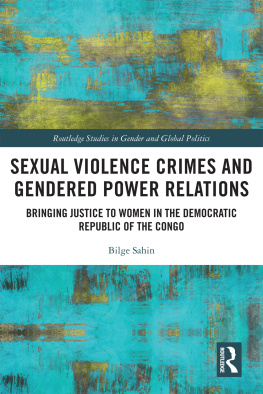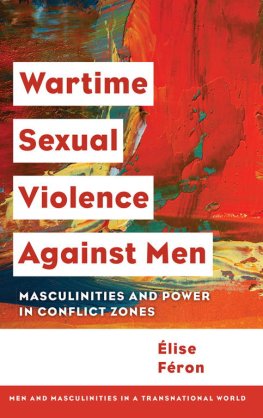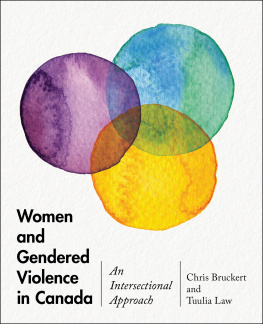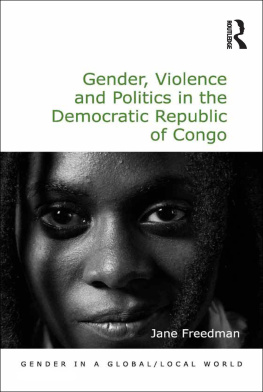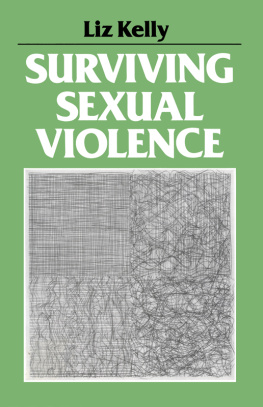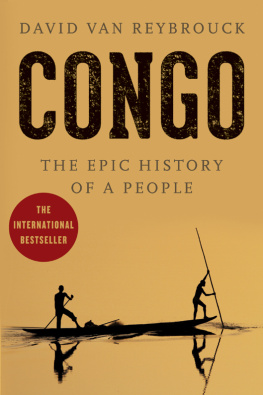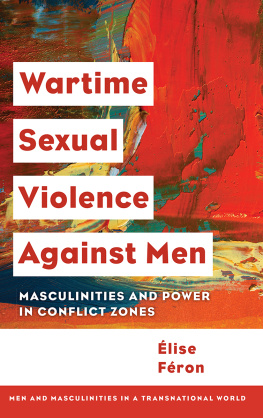Sexual Violence Crimes and Gendered Power Relations
This book provides a robust gendered analysis and establishes a feminist approach to international actors responses to sexual violence crimes in conflict in eastern Democratic Republic of the Congo (DRC) and the impact of these global political practices on local gendered power relations.
Sexual violence crimes in eastern DRC have received significant global attention and triggered calls by the international community to end this violence. This book critically assesses international assistance to the Congolese legal system to challenge sexual violence crimes, to determine to what extent it engages with the continuum of gendered violence from peacetime to conflict. It also examines whether international assistance has produced any transformations in gendered power relations in eastern DRC. The author investigates how challenging sexual violence crimes in conflict necessitates broader female empowerment and engagement with gendered power relations.
This book will be of interest to scholars and postgraduate students in gender studies, development studies and international relations. It will also provide significant guidance for professionals working for development agencies and international NGOs focusing on eastern DRC.
Bilge Sahin has degrees from Ankara University, Turkey (BA and MA) and SOAS University of London, UK (MA and PhD). Her academic work critically engages with gendered issues in international security and international law, and feminist theory with particular focus on East Africa. Her work has been published in peer-reviewed academic journals.
Currently, she is a Lecturer in the International Relations Department at Bolu Abant Izzet Baysal University, Turkey. She is also a Research Associate in the Department of Development Studies at SOAS University of London, UK.
In addition to her academic work, she has experience advising university projects, governmental institutions and law firms on matters related to the DRC.
Routledge Studies in Gender and Global Politics
This series aims to publish books that work with, and through, feminist insights on global politics, and illuminate the ways in which gender functions not just as a marker of identity but also as a constitutive logic in global political practices. The series welcomes scholarship on any aspect of global political practices, broadly conceived, that pays attention to the ways in which gender is central to, (re)produced in, and is productive of, such practices.
There is growing recognition both within the academy and in global political institutions that gender matters in and to the practices of global politics. From the governance of peace and security, to the provision of funds for development initiatives, via transnational advocacy networks linked through strategic engagement with new forms of media, these processes have a gendered dimension that is made visible through empirically grounded and theoretically sophisticated feminist work.
Series Editor: Laura J. Shepherd, UNSW Australia
Gendering Peace
UN Peacebuilding in Timor-Leste
Sarah Smith
Female Combatants After Armed Struggle
Lost in Transition?
Niall Gilmartin
The Globalization of Gender
Knowledge, Mobilizations, Frameworks of Action
Edited by Ioana Crstocea, Delphine Lacombe and Elisabeth Marteu
Young Women and Leadership
Edited by Katrina Lee-Koo and Lesley Pruitt
Sexual Violence Crimes and Gendered Power Relations
Bringing Justice to Women in the Democratic Republic of the Congo
Bilge Sahin
Sexual Violence Crimes and Gendered Power Relations
Bringing Justice to Women in the Democratic Republic of the Congo
Bilge Sahin
First published 2021
by Routledge
2 Park Square, Milton Park, Abingdon, Oxon OX14 4RN
and by Routledge
52 Vanderbilt Avenue, New York, NY 10017
Routledge is an imprint of the Taylor & Francis Group, an informa business
2021 Bilge Sahin
The right of Bilge Sahin to be identified as author of this work has been asserted by her in accordance with sections 77 and 78 of the Copyright, Designs and Patents Act 1988.
All rights reserved. No part of this book may be reprinted or reproduced or utilised in any form or by any electronic, mechanical, or other means, now known or hereafter invented, including photocopying and recording, or in any information storage or retrieval system, without permission in writing from the publishers.
Trademark notice : Product or corporate names may be trademarks or registered trademarks, and are used only for identification and explanation without intent to infringe.
British Library Cataloguing-in-Publication Data
A catalogue record for this book is available from the British Library
Library of Congress Cataloging-in-Publication Data
A catalog record has been requested for this book
ISBN: 978-0-367-86147-6 (hbk)
ISBN: 978-1-003-01719-6 (ebk)
Typeset in Times New Roman
by Deanta Global Publishing Services, Chennai, India
To my dear mother who taught me the importance of being a feminist
&
To my beautiful nieces who I believe will become powerful and brilliant women in the future.
I would like to express my deepest appreciation to the countless individuals and especially the Congolese women in North Kivu and South Kivu who helped me, devoted time to me and shared their experiences and thoughts with me. All these contributions became the biggest guidance for this book.
This book would not have been possible without the support of Prof. Dr. Zo Marriage. Her endless patience, enthusiasm and intellectual guidance encouraged me to do my best in this research. She not only inspired me but also became a role model for my academic career.
I would also like to thank Dr. Gina Heathcote for her support and guidance throughout my time at SOAS as well as Dr. Phil Clark and Dr. Jane Freedman for their valuable comments.
I was truly lucky to have the support of my partner, Moritz Koenig. All the sacrifices he made for me and his emotional and intellectual support gave me the strength to complete my book.
I would like to thank Ceren Kocaman for being always there for me whenever I need. Also, my special thanks go to Arsene Tungali and Innocent Mazombo, who always helped me in the DRC.
This acknowledgement seems wholly inadequate without recognizing the impact of SOAS and the people I met there. The unique environment of SOAS sharpened my intellectual profundity and became an incredible life experience. Furthermore, my friends at SOAS not only emotionally and intellectually accompanied me throughout my research but also became like a family. My thanks go to Radhika Patel, Irem Sengul, Ayse Arslan, Akif Avc, Sila Demirors, Serena Merrino, Joanne Thomkinson, Francesco Formichella, Bruno Hofig, Pedro Lourerio, Matteo Pintor, Joshua Rogers and all my other dear friends at SOAS.
My greatest fortune has been to have the support of my family. Their endless love and trust in me helped me achieve every accomplishment in my life and this book is just one of them.
I am also grateful to Sue Redgrave for her help and brilliant comments and my dear editors at Routledge, Laura J. Shepherd, Emily Ross, Jessica Holmes, Sophie Iddamalgoda and Hannah Rich.

